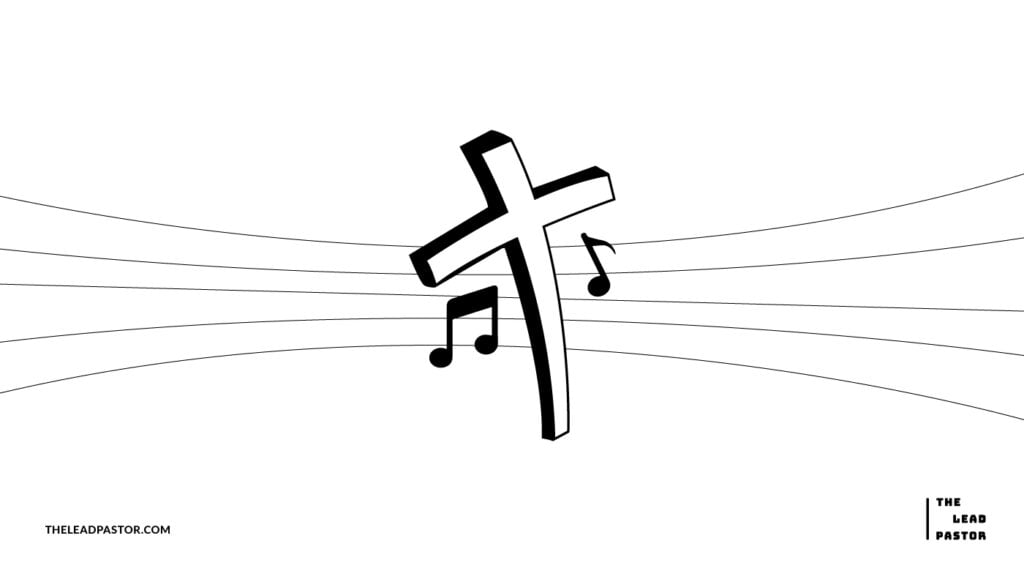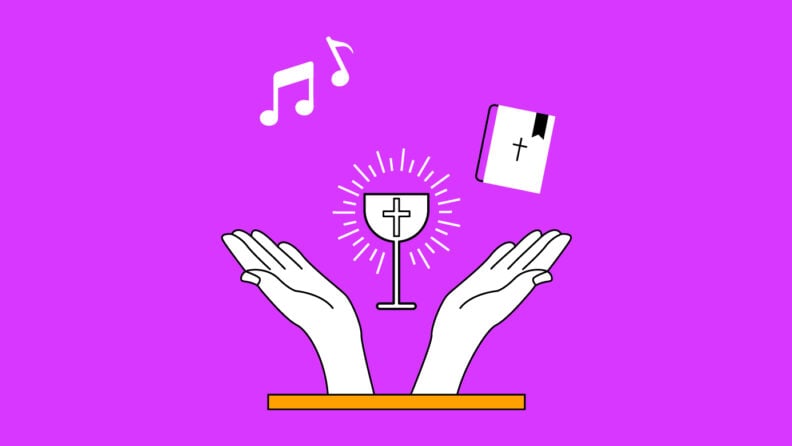“In the end, worship can never be a performance, something you're pretending or putting on. It's got to be an overflow of your heart. Worship is about getting personal with God, drawing close to God.” – Matt Redman
As we all know, worship is a massive part of the Christian faith. I absolutely love to worship. Not only on a Sunday morning but also in my own private times of worship during the week.
I started leading worship in the church when I was 12 years old, and have had the incredible opportunity to travel and lead worship, teach on worship and the holy spirit, and mentor other worship leaders. Worship is not only my favorite thing to do, but it's also one of my favorite things to talk about.
I’ll cover:
Why Worship?
Christian worship encourages and strengthens us; it edifies us. It brings us closer to God, and often it gives us the strength we need to face another day or another week.
Worship can be the tool we need to face the seasons in our life. It has the ability to shift our mindset or change our perspective on situations.
Different Types Of Worship
At its core, Christian worship is a way of expressing reverence, adoration, and devotion to God.
True worship is an act of honoring and giving thanks to Him and seeking to deepen our relationship with Him. Worship can take many forms, including prayer, singing, chanting, meditation, rituals, and acts of service to others.
Christian worship is largely based on the things Scripture has to say about it (we've written about some excellent theological study podcasts and other resources, as well.) That being said, in this article, we will take a look at a few different types of worship and how they can apply to our lives today.
Liturgical Worship
I have many memories as a child of visiting my grandmother and going to church with her. She attended an Anglican Church, and their church did liturgical-style worship. My family attended a more contemporary church so I remember as a child being so confused about when to stand when to sit, and what to say.
In my mind church services involved 20 minutes of singing, hearing a sermon, and then going home to eat a roast dinner. But as an adult looking back, I do see the beauty in the liturgy with the reverence of the prayers and the scripture.
More recently, we are seeing a shift in some Protestant churches to incorporate the liturgical style. It is a sacred form of worship that some churches are wanting to preserve, and also use as a way to teach worship to their church.
Simply said, liturgical style worship is a more structured style of worship that follows a prescribed order or set of rituals. Liturgy is derived from the Greek word "leitourgia," which means "public service”, or “work for the people."
In liturgical worship, the emphasis is on the communal aspect of worship, with participants coming together to praise and honor God through a shared set of prayers, hymns, and rituals.
The order of the service is always carefully planned and prescribed, often following a routine or cycle of events. The use of specific prayers, readings from holy texts, and music are all pre-determined and carefully chosen. The aim of liturgical worship is to create a sense of order, harmony, and reverence within the church.
Liturgical worship is designed to engage all of the senses, with visual, auditory, and physical elements all playing a role in the worship service. Sometimes the congregation may engage in symbolic actions, such as crossing themselves, kneeling, or bowing, as well as singing hymns and reciting prayers.
In some church contexts, the use of candles, incense, and other sensory elements can also contribute to the atmosphere of the service, creating a sense of awe and reverence.
Overall, liturgical worship serves as a way for the church congregation to come together for corporate worship and connect with God through a shared experience of ritual and worship. The beauty of it is that it creates a sense of continuity and tradition while connecting modern-day worshipers to the long history of their religious tradition!
Non-Liturgical Worship
Non-liturgical worship, or “contemporary worship” as it is often called, is a form of worship that emphasizes the use of more modern style music, technology, and visual arts during services.
Unlike traditional worship, which often includes hymns, liturgy, and formal prayers, contemporary worship is characterized by the use of contemporary Christian praise and worship songs, such as rock, pop, and gospel.
It’s also characterized by a more relaxed, informal atmosphere, often including a full band of musicians. You can see this demonstrated with worship bands like Elevation Worship and Bethel Worship.
Another hallmark of contemporary worship is a focus on personal experience and connection with God, rather than the strict ritual of worship. In some scenarios, this can include the use of personal testimonies. Perhaps someone has a word of scripture to share with the church, or they may feel like the Lord has given them a word or a picture.
While this isn't always common in contemporary worship services, it is something that has proven to be more interactive and helps worshippers engage with the Lord on a deeper level.
Overall, contemporary worship is a dynamic and evolving form of worship that seeks to engage with modern culture and create a more meaningful and relevant worship experience for contemporary Christians.
While it may not appeal to everyone, it has become a popular choice for many churches seeking to reach more people and create a more inclusive and welcoming worship environment.
Personal Private Worship
Personal worship allows us to express our worship and adoration to the Lord in a unique way. It doesn’t need to be in an official place of worship. It can be any time of the day, and anywhere. In our office, driving in the car, while preparing dinner, or even alone in our bedroom.
It can be a source of comfort, solace, and inspiration, as well as a means of seeking guidance, forgiveness, or enlightenment. Personal worship can also serve as a way to deepen our relationship with the Lord,
For pastors and worship pastors, this is absolutely essential. If we are not meeting and worshiping the Lord in private during the week, how are we able to stand on a Sunday morning and lead a congregation? It's hard to lead people to places you have not been yet yourself.
When training worship leaders, I have always emphasized the importance of worshiping alone through their Sunday setlists. Often I have thought I had a set list finalized but after worshiping through it a couple of times, I felt that I needed to change a song or two, and on Sunday morning that one new song I had brought into the setlist ended up being a key song for the service.
Worship and Service to Others
Another act of worship is through acts of service to others. This involves putting our faith into action by selflessly serving others and helping to meet their needs. Worship through acts of service is also emphasized throughout the Old Testament and New Testament.
In Matthew 25:35-40, the Lord Jesus Christ says, "For I was hungry and you gave me something to eat, I was thirsty and you gave me something to drink, I was a stranger and you invited me in, I needed clothes and you clothed me, I was sick and you looked after me, I was in prison and you came to visit me... whatever you did for one of the least of these brothers and sisters of mine, you did for me." This passage highlights the importance of serving others as a way of serving God.
In James 1:27, the apostle writes, "Religion that God our Father accepts as pure and faultless is this: to look after orphans and widows in their distress and to keep oneself from being polluted by the world." Here, James emphasizes the importance of caring for those in need as a key aspect of “true religion”.
Through acts of service, we are able to live out our faith and demonstrate our love for God and others. As we serve others, we reflect the character of Christ, who came not to be served, but to serve (Mark 10:45).
By putting the needs of others before our own, we are able to experience the joy and fulfillment that comes from living a life of purpose and meaning!
Worship through acts of service is a powerful way to demonstrate one's faith and make a positive impact in the world!
What Is Worship Music?

Plainly said, worship music is characterized by its lyrical content. Often worship music focuses on themes of praise, adoration, and gratitude.
Worship music can take many forms, including hymns, gospel songs, contemporary Christian music, and traditional religious music from various cultures around the world. The primary focus is to help the church connect with God and to express their love, devotion, and worship of God.
If we look at scripture there are many bible verses that emphasize the importance of using music to praise God.
Here are a few examples.
- "Sing to the Lord a new song; sing to the Lord, all the earth. Sing to the Lord, praise his name; proclaim his salvation day after day" (Psalm 96:1-2).
- "Let the message of Christ dwell among you richly as you teach and admonish one another with all wisdom through psalms, hymns, and songs from the Spirit, singing to God with gratitude in your hearts" (Colossians 3:16).
- "I will sing of the Lord’s great love forever; with my mouth, I will make your faithfulness known through all generations" (Psalm 89:1).
- "Praise the Lord. Sing to the Lord a new song, his praise in the assembly of his faithful people" (Psalm 149:1).
These verses demonstrate the importance of using music to praise and worship God, as well as the power of music to inspire and unite Christians in their faith!
Who Is The Worship Leader?
The worship leader is the one who is responsible for leading the music and worship elements of a church service.
It's important that the worship leader works in close collaboration with the church's pastor to plan and coordinate the music for each service, selecting songs that align with the theme and message of the day.
During the service, the worship leader will lead the congregation in singing, and serve as a key leader within the church, using music to create a space for believers to connect with God.
What Are Worship Teams?
The size of your worship team will depend on the size of your church. This team typically includes musicians, vocalists, sound technicians, and visual technicians.
The worship team works closely with the church worship leader and pastor to plan and coordinate the music for each service, selecting songs and preparing music arrangements that align with the theme and message of the day.
Overall, the worship team plays a vital role in creating a space for the church to sing and worship and connect with God!
How To Lead Worship Teams
Leading a worship team can be a challenging but rewarding task. The biggest thing to remember is that, to effectively build and lead a worship team, it is so important to have a clear vision and mission for the team and to communicate that vision to the members.
Communication is key. This includes setting goals and objectives for the team, establishing clear expectations for each member's role and responsibilities, and providing ongoing training and support to help the team members develop their skills and abilities.
It is also important to foster a positive and collaborative team culture, where each member feels valued and supported and where disagreements are addressed in a respectful and constructive manner.
Worship Software

Using worship software in churches has become increasingly popular in recent years, as it provides a variety of tools to help worship leaders and teams plan and executes services.
Worship presentation software can assist with tasks such as selecting and arranging songs, creating chord charts and sheet music, coordinating audio and visual elements, and managing the schedule and availability of team members.
Many worship software platforms also offer features such as song databases, online collaboration tools, and mobile apps, making it easier for worship teams to work together and stay organized.
In addition, church presentation software (closely related to worship software) can help to enhance the overall worship experience by providing high-quality audio and visual elements, such as pre-recorded backing tracks, on-screen lyrics, and interactive multimedia presentations. Read our list of the best free church presentation software here.
While worship software can be a valuable tool for churches, it is important to use it in a way that complements and enhances the spiritual and emotional aspects of worship, rather than detracting from them!
As with any technology, the focus should remain on creating an environment where the church can worship and connect with God.
Now What?
Are you still with me? This may seem like a lot to take in, and it is.
But in conclusion, worship is a vital aspect of our relationship with the Lord, it provides a space for us to connect with him through music, prayer, and other forms of spiritual expression.
Whether through personal worship, acts of service, or participation in a worship team or church service, there are many ways to engage in worship and deepen our relationship with God.
By exploring the various aspects of worship, and reflecting on what we have learned, we as Christians can gain a greater understanding of the spiritual significance of worship and how it can impact our lives as we glorify Him!
Ultimately, worship is an ongoing journey of spiritual growth and discovery, and by embracing it as such, we can grow in the knowledge of the transformative power of worship in our lives.
Learn more about worship and church presentation by subscribing to The Lead Pastor newsletter.


